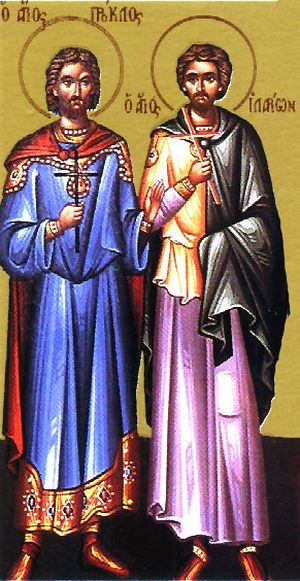The Holy Martyrs Proclus and Hilarion were natives of the village of Kallippi, near Ancyra, and they suffered during the time of a persecution under the emperor Trajan (98-117). Saint Proclus was put under arrest first. Brought before the governor Maximus, he fearlessly confessed his faith in Christ. The governor decided to compel the saint to submit himself to the emperor and offer sacrifice to the pagan gods. During his tortures, the martyr predicted to Maximus that soon he himself would be compelled to confess Christ as the true God. They forced the martyr to run after the chariot of the governor, heading towards the village Kallippi. Exhausted, Saint Proclus prayed that the Lord would halt the chariot. By the power of God the chariot halted, and no force could move it from the spot. The dignitary sitting in it became petrified. The martyr told him that he would remain unmoving until such time as he would sign a document with a confession of Christ. Only after this could the chariot continue on its way with the governor.
The humiliated pagan took fierce revenge on Saint Proclus. He commanded that Proclus be led out beyond the city, tied to a pillar and shot with arrows. The soldiers, leading Saint Proclus to execution, told him to give in and save his life, but the saint said that they should follow their orders.
Along the way to the place of execution, they met Hilarion, the nephew of Saint Proclus, who with tears embraced his uncle and also confessed himself a Christian. The soldiers seized him, and he was thrown into prison. The holy Martyr Proclus prayed for his tormentors and surrendered his soul to God beneath a hail of arrows.
Saint Hilarion was brought to trial and, with the same courage as Saint Proclus, confessed himself a Christian. After tortures he was sentenced to death. They tied the martyr’s hands and dragged him by his feet through the city, wounded and bloody, and then they beheaded him three days after the death of his uncle, the holy Martyr Proclus. Christians buried them together in a single grave.

